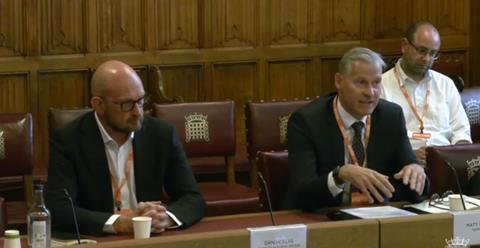Construction director at Wembley Park developer says firm would pay higher fees if it improved transparency at regulator
Quintain’s construction director has warned delays at the ĐÇżŐ´«Ă˝ Safety Regulator (BSR) are deterring investors and could result in people losing their jobs.
Matt Voyce told peers at an oral evidence session in Parliament yesterday that lengthy and ongoing hold-ups for gateway 2 approvals on schemes are “leading to a redeployment of investment away from house building”.
He also said the government’s 1.5 million homes target could be at risk unless it fixes issues with how the regulator signs off higher risk buildings, defined as schemes above 18m which contain at least two dwellings.

Data published by cost consultant Cast this week showed just one in 10 gateway 2 applications for new build schemes, needed for construction to start, have been approved, while the status of nearly 80% were unknown.
The data, which covers the entire period of the regime from its rollout in October 2023 to the end of last month, also found only 19% of gateway 2 applications for work on existing buildings had been given the all clear.
Voyce, who leads Quintain’s 8,500-home Wembley Park regeneration around Wembley stadium, was speaking at the opening session of a cross-party inquiry into the delays launched last week by the House of Lords’ industry and regulators committee.
He said the 18 months the regime has been operating was enough time to resolve initial “teething problems” and it was now “very clear that something is not working in the system”.
Investors were being spooked by the length of time it can take to get responses from the BSR – with the worst cases taking up to a year – and the level of uncertainty around whether building safety applications would be approved at the end of the process, he said.
Voyce also criticised the regulator’s practice of preventing communication between its multidisciplinary teams (MDTs) which assess applications and applicants’ own in-house experts.
He said this was exacerbated by a lack of guidance provided by the BSR on what is needed to make a scheme compliant, likening the situation to working in a “vacuum” while describing the level of collaboration offered by the regulator as a “black hole”.
“There are developers that I talk to, very well known developers that build fantastic buildings all across the country, and they are stuck, just like a lot of us, in the gateway 2 process. So it’s clear to me that the guidance isn’t clear enough,” Voyce said.
He added: “At the moment, we’re in a vacuum where we’re kind of guessing what information is required. What that’s asking developers to do is to spend an awful lot more money to progress the design to a point they believe will be sufficient to submit to the BSR and get an approval.
“But that’s an unknown. So there’s a concern that that increased ask on equity, without any certainty of a successful outcome, or indeed when that outcome will happen, is going to deter investment into house building, it’s going to stall projects, and potentially people will lose their jobs.”
Voyce suggested approvals could be speeded up if the regulator had a better understanding of developer pipelines, including on large multi-phased projects, proposing a two-tier approach where part of the BSR would focus on large developers and another part would work on smaller schemes.
He also called for the regulator to move its MDTs in-house, even if this resulted in higher costs for applicants.
“Would I pay more? It’s an awful lot being asked of developers at this moment in time. Viability is on a knife edge. But if there was transparency on my application, and a certainty on when I could expect to receive an approval, then I probably would pay more, yes.”
Voyce was speaking at the session alongside Dan Hollas, director of building safety at Clarion, the UK’s largest housing association.
Hollas admitted Clarion’s development programme has not been as large in recent years as it has previously partly because “it’s so difficult to make the schemes work for us”.
“With the pace at the moment, then it just means it’s another big risk for us in terms of creating a development programme,” he said, adding that the affordable homes provider was having to consider whether schemes could be delivered in a “reasonable time frame”.
The first hearing of the Lords inquiry came on the same day the Health and Safety Executive (HSE), which oversees the BSR, announced Philip White would step down as the head of the regulator in September.
White, who has been director of building safety since December 2023, had announced his decision internally in March but it was not made public until yesterday.
The HSE has already started a recruitment process for White’s successor. White, who said the move was a “partial retirement”, will retain his role as the chief inspector of buildings.























No comments yet